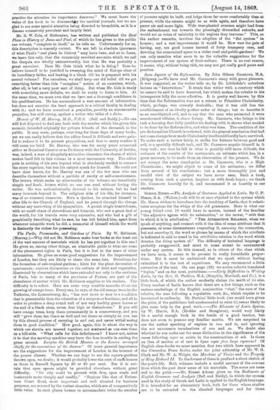The Parks, Promenades, and Gardens of Paris. By W. Robinson.
(Murray.)—Why did not Mr. Robinson make four books at the least out of the vast amount of materials which he has put together in this one ? He gives us, among other things, an admirable guide to what are some of the pleasantest sights in Paris, but it is lost in the mass of other information. He gives us some good suggestions for the improvement of London, but they are likely to share the same fate. Directions for the formation of sub-tropical gardens ; hints for the plant decoration of apartments ; copious discussions on the culture of fruit and vegetables, illustrated by observations which have extended not only to the environs of Paris, but to many of the provinces of France, are part of the abundance of matter which Mr. Robinson supplies to his readers. The difficulty is to select. Here are some very sensible remarks about the growing of orange trees. Every one, he says, of the old orange trees in the Tuileries, the Luxembourg, &c., " has cost more to rear to a condition that is presentable than the education of a surgeon or barrister, and all in order to produce a deep round tuft of not very healthy green loaves at the end of a black stem, seven feet high or thereabouts." If you will have orange trees, keep them permanently in a conservatory, and you will "grow them ten times as well and ten times as cheaply as you can by this absurd process of carrying in and out and never withal seeing them in good condition." How good, again, this is about the way in which our shrubs are massed together, not scattered as one sees them on a hill-side. " What calls for this definiteness ? I know not, unless it be that the mowing machine may have the less trouble in cutting the grass around. Imagine the British Museum or the Louvre arranged chiefly for the convenience of the dusters." Of more general importance are the suggestions for the improvement of London in the interest of the poorer classes. Whether we can hope to see the square-gardens thrown open, we doubt ; it would probably lower the rent of such houses as those in Russell Square by 30 or 40 per cent. But it is cer- tain that open spaces might be provided elsewhere without great difficulty. "No city could be pierced with free, open roads and boulevards more cheaply and readily," "Regions like that of Totten- ham Court Road, most important and well situated for business purposes, are covered by the veriest shanties, which are of comparatively little value. In such places houses to accommodate twice the number of persons might be built, and lodge them far more comfortably than at Truant, while the streets might be as wide again, and therefore have purer air and more light. Wide tree-planted avenues might lead from the embankment out towards the pleasingly diversified suburbs, and would act as veins of salubrity to the regions they traverse." This, as the author remarks, involves the adoption of the "flat system" in houses ; and a vast improvement it wpuld be. How vast the gain of having, say, ten good houses instead of forty trumpery ones, and devoting the economized space to a wider road and public gardens! We can only mention what seem to us the valuable suggestions for the improvement of our system of fruit-culture. There is no real reason, it seems, why, without being rich, we may not get really good pears and peaches.






























 Previous page
Previous page